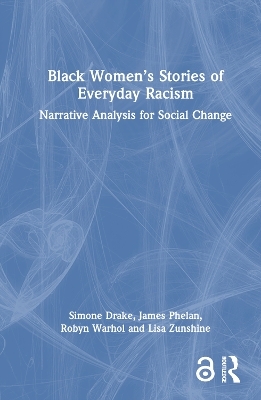
Black Women’s Stories of Everyday Racism
Routledge (Verlag)
978-1-032-60662-0 (ISBN)
Black Women’s Stories of Everyday Racism puts literary narrative theory to work on an urgent real-world problem. The book calls attention to African American women’s everyday experiences with systemic racism and demonstrates how four types of narrative theory can help generate strategies to explain and dismantle that racism. This volume presents fifteen stories told by eight midwestern African American women about their own experiences with casual and structural racism, followed by four detailed narratological analyses of the stories, each representing a different approach to narrative interpretation. The book makes a case for the need to hear the personal stories of these women and others like them as part of a larger effort to counter the systemic racism that prevails in the United States today.
Readers will find that the women’s stories offer powerful evidence that African Americans experience racism as an inescapable part of their day-to-day lives—and sometimes as a force that radically changes their lives. The stories provide experience-based demonstrations of how pervasive systemic racism is and how it perpetuates power differentials that are baked into institutions such as schools, law enforcement, the health care system, and business. Containing countless signs of the stress and trauma that accompany and follow from experiences of racism, the stories reveal evidence of the women’s resilience as well as their unending need for it, as they continue to feel the negative effects of experiences that occurred many years ago. The four interpretive chapters note the complex skill involved in the women’s storytelling. The analyses also point to the overall value of telling these stories: how they are sometimes cathartic for the tellers; how they highlight the importance of listening—and the likelihood of misunderstanding—and how, if they and other stories like them were heard more often, they would be a force to counteract the structural racism they so graphically expose.
The Open Access version of this book, available at http://www.taylorfrancis.com, has been made available under a Creative Commons Attribution (CC-BY) 4.0 license.
Simone Drake, Hazel C. Youngberg Trustees Distinguished Professor of English at Ohio State University, is executive producer of Shutdown (2023) and author or editor of the following books: Critical Appropriation: African American Woman and the Construction of Transnational Identity (2014), When We Imagine Grace: Black Men and Subject Making (2016), Are You Entertained?: Black Popular Culture in the 21st Century (2020), and The Oxford Handbook of African American Women’s Writing (2024). James Phelan, Distinguished University Professor of English at Ohio State University, is the author, co-author, editor, or co-editor of over 20 books, including Somebody Telling Somebody Else (2017), Debating Rhetorical Narratology (with Matthew Clark, 2020), and Narrative Medicine: A Rhetorical Rx (2023). He has been editor of Narrative since its inception in 1993. Robyn Warhol, College of Arts and Sciences Distinguished Professor of English at Ohio State University, has recently published The Edinburgh Companion to Contemporary Narrative Theories (co-edited with Zara Dinnen, 2018), Narrative Theory Unbound (co-edited with Susan S. Lanser, 2015), and Love Among the Archives (co-authored with Helena Michie, 2015). Lisa Zunshine, Professor of English at the University of Kentucky, is a former Guggenheim fellow and the author or editor of 12 books, including Getting Inside Your Head (2012), The Oxford Handbook of Cognitive Literary Studies (2015), and The Secret Life of Literature (2022).
Part I. Black Women’s Stories of Everyday Racism
Chapter 1. “I Keep Most White People at a Distance”
Ronda C. Henry Anthony
Chapter 2. “I Would Love to Have Had that Conversation with Him”
Scotia Brown
Chapter 3. “Something I Never Recovered From”
Mary Bullock
Chapter 4. “Women of Color Really Have to Understand, or Overstand”
Stephanie Caraway
Chapter 5. “No One Even Knows the Real Story”
Destiny Faceson
Chapter 6. “At that Moment I Felt—Dismissed”
Felicia Haney
Chapter 7. “I Was Never Considered an Asset to their Company in the First Place”
Lucrezia Hatfield
Chapter 8. “Racism Has Truly Shaped My Choices and How I Act”
Latoya Hale Tahirou
Part II. Introduction to the Narrative Analyses of the Women’s Stories
Chapter 9. Testifyin’ and Signifyin’: Black Women’s Narratives on Navigating Structural Racism in Central Indiana
Simone Drake
Chapter 10. She Was Not Heard: Personal Narratives that Tackle Structural Racism
Robyn Warhol
Chapter 11. Metacognition and Miscommunication: Interpreting Metacognitive Monitoring in African-American Women’s Storytelling
Lisa Zunshine
Chapter 12. Rhetorical Listening: Character, Progression, and Fictionality in African American Women’s Stories of Everyday Racism
James Phelan
Appendix: Storytelling Prompts Provided by the Researchers
| Erscheinungsdatum | 12.04.2024 |
|---|---|
| Verlagsort | London |
| Sprache | englisch |
| Maße | 156 x 234 mm |
| Gewicht | 453 g |
| Themenwelt | Geisteswissenschaften ► Psychologie ► Allgemeine Psychologie |
| Geisteswissenschaften ► Psychologie ► Verhaltenstherapie | |
| Geisteswissenschaften ► Sprach- / Literaturwissenschaft ► Anglistik / Amerikanistik | |
| Geisteswissenschaften ► Sprach- / Literaturwissenschaft ► Literaturwissenschaft | |
| Sozialwissenschaften ► Ethnologie | |
| Sozialwissenschaften ► Soziologie ► Gender Studies | |
| Sozialwissenschaften ► Soziologie ► Spezielle Soziologien | |
| ISBN-10 | 1-032-60662-2 / 1032606622 |
| ISBN-13 | 978-1-032-60662-0 / 9781032606620 |
| Zustand | Neuware |
| Informationen gemäß Produktsicherheitsverordnung (GPSR) | |
| Haben Sie eine Frage zum Produkt? |
aus dem Bereich


